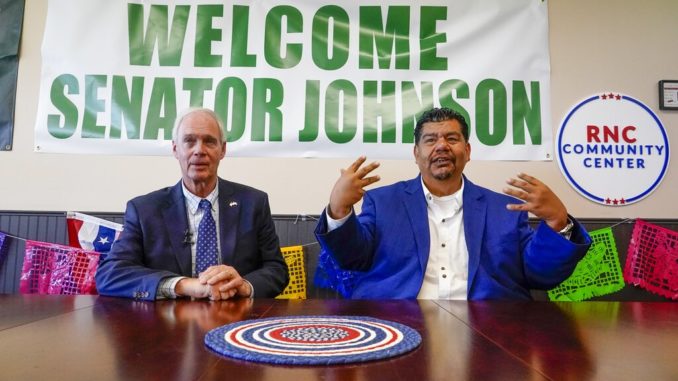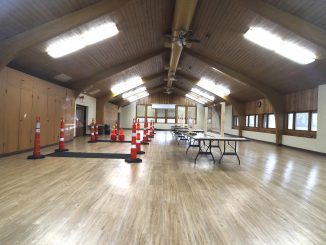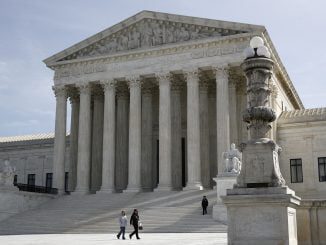
MILWAUKEE — In two decades of street outreach on Milwaukee’s south side, evangelical pastor Marty Calderon has offered Bible study, gang prevention, a safe place to stay for those battling addiction, and help getting jobs for those newly released from prison.
But as he’s watched rising crime threaten those efforts to “clean up” his impoverished neighborhood, Calderon started bringing Republican politicians to his ministry, God Touch.
He hopes the largely Hispanic, working-class community will hear what they can do for it — and the conservative candidates will learn these voters’ reality, especially their immigration journeys.
“We’ve never had the Republicans come as strong as they are. … I’m very cautious doing this because I just don’t want people thinking they’re going to come get a vote,” Calderon said in his sanctuary, adding that he doesn’t push specific candidates on his community. “I’m just saying go out and vote, and pray about it.”
Republican candidates across the country are seeking to expand recent gains the party has made with Hispanic voters from Florida to the Rio Grande Valley to Los Angeles. What seems to be driving them are bread-and-butter issues that Calderon’s neighbors constantly mentioned to Associated Press reporters last week — rampant lawlessness, struggling schools, and food and gas prices creeping beyond their paychecks’ reach.
Those consistently matter more to Latino voters than immigration, allowing Republicans to make inroads that constitute a “big realignment” — if they end up splitting their vote close to 40% Republican and 60% Democratic instead of historically a third of Latinos voting with the right, said Geraldo Cadava, a Northwestern University history and Latino studies professor.
Swinging even a few thousand votes in a state like Wisconsin — which delivered minuscule margins for Donald Trump in 2016 and Joe Biden in 2020 — could impact national politics because GOP Sen. Ron Johnson is in a close reelection race with Democratic challenger Lt. Gov. Mandela Barnes.
A month before the midterms, Johnson was talking about the importance of “renewed faith” as he met with Calderon and other community leaders in the Republican National Committee’s one-year-old Hispanic outreach center, two blocks from God Touch.
“We’re showing up,” Johnson said of the party’s outreach in communities like this. “We have a universal message.”
These efforts encourage Hilario Deleon, 21, who grew up on the south side and, after losing his dishwashing job during the COVID-19 lockdown, got involved in Republican campaigning.
“We’ve failed in the past to be in the community,” he said of the GOP. He added that he likes to see political and faith leaders walking the walk, like Calderon’s weekly food distribution. “I like to see God through people’s actions.”
Wisconsin’s elections commission doesn’t collect race or ethnicity data, but the immigrant rights advocacy group Voces de la Frontera estimates there are about 180,000 voters among the state’s Hispanics, nearly 40% of whom live in Milwaukee. Most are of Mexican origin, followed by Puerto Ricans.
And 46% of Latino registered voters consider themselves independent, according to pollster Charles Franklin of Marquette University Law School. His aggregate polling data over the last two years shows that Wisconsin Latino voters fall about halfway between whites and blacks on political issues — and 71% identify as Christian.
“Political parties can’t take this population for granted,” said Felipe Hinojosa, a professor at Texas A&M University who studies the connection between religion and politics among Latinos.
“Folks on the ground hear, ‘No one ever reached out to us before’ or ‘I didn’t expect Republicans to reach out to us,'” said Ana Carbonell, a consultant for Hispanic outreach with the National Republican Senatorial Committee, which launched Vamos efforts this midterm season in nine key states, including Wisconsin.
In a late September poll by the Pew Research Center, more Latinos said they felt that the Democratic Party “works hard to earn Latinos’ vote” and “cares about Latinos” than the Republican Party.
The historic lack of outreach to the Latino community leaves Hispanic voters to “bundle” their own issues, often based on faith, instead of buying into an “ideological package” from either party, said Ali Valenzuela, an American University professor of Latino politics. That can benefit Republicans when the focus is on the economy, as in these midterms.
Since April, Vamos in Wisconsin has contacted more Hispanic voters there than over the last three election cycles combined — voters like the woman who chucklingly told two Vamos canvassers last week, “You’re in the wrong neighborhood.”
“I can always learn more,” she nevertheless added, taking their fliers.




